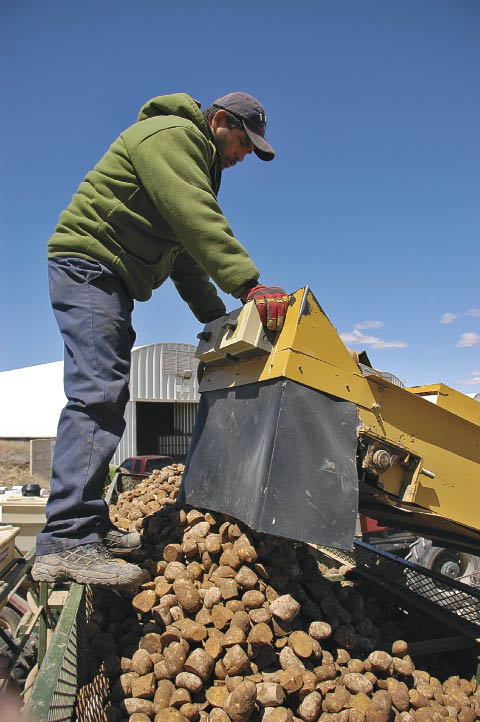 In the children's fairytale story The King With Six Friends by Jay Williams, a king without a kingdom seeks a princess's hand in marriage by passing three seemingly impossible tasks. He passes all three tests using the talents of six friends he met and assisted along the way to this kingdom without a successor. In the end of the book, someone asks one of the six friends what the king did to deserve this kingdom, seeing how it was the talents of the six that completed the tests. The friend wisely replies that he did what a good king should do-"he lead us."
In the children's fairytale story The King With Six Friends by Jay Williams, a king without a kingdom seeks a princess's hand in marriage by passing three seemingly impossible tasks. He passes all three tests using the talents of six friends he met and assisted along the way to this kingdom without a successor. In the end of the book, someone asks one of the six friends what the king did to deserve this kingdom, seeing how it was the talents of the six that completed the tests. The friend wisely replies that he did what a good king should do-"he lead us."
Kirk Egbert of Terreton, Idaho, knows all about delegation. As an LDS bishop in a student congregation at Brigham Young University-Idaho, he delegates duties to two counselors.  As a fresh-market grower in eastern Idaho, he relies heavily on the expertise of his employees to keep the operation running smoothly.
As a fresh-market grower in eastern Idaho, he relies heavily on the expertise of his employees to keep the operation running smoothly.
Kirk grew up in the Teton Valley in a family of sheep farmers. His grandfather, Dick, who was an Idaho state senator for 30 years, decided to move the sheep from the Teton Valley to the St. Anthony area to lamb before moving to the Terreton area in western Jefferson County, where there wasn't as much snow accumulation.
The family ended up setting down roots in Terreton when Kirk's father, Phillip, grew weary of moving the family roughly 70 miles one way, back and forth between Tetonia in the summer and Terreton for the lambing season. His grandfather, who was one of the largest landowners in the state of Idaho in the 1970s, also owned ground in the Terreton area.
The two bought farms, including the Egbert-Walker farm in Hamer, and continued to expand operations until Phillip died when Kirk was only nine years old.
 While the Egbert-Walker farm grew potatoes, the Walkers were running the operation. Kirk himself learned how to grow potatoes from a church youth advisor named Carl Johnson, a grower south of where Kirk's farm is now.
While the Egbert-Walker farm grew potatoes, the Walkers were running the operation. Kirk himself learned how to grow potatoes from a church youth advisor named Carl Johnson, a grower south of where Kirk's farm is now.
When Kirk turned 19, he served a mission for his church in Lansing, Mich., the same mission his future wife, Kathryn, was serving at the time. The two met briefly before their missions in Rexburg when Kirk was dating Kathryn's sister.
The two have five children: four girls and one boy. Their oldest, Ashley, teaches junior high English in the Utah Valley. Alexandria graduated from BYU-I and is working in Blackfoot at Bingham Memorial in admissions. Austin returned from an LDS mission and is an integral part of the farm. They also have a daughter, Hailey, at Utah Valley University in Orem, Utah, and a daughter in high school, Hannah.
The youngest two are rodeo girls. Hailey went to state in pole bending, and Hannah went to state in barrels last year.
Kirk graduated with an associate's degree from Ricks College in Rexburg in 1987 and with the help of a few people, started his own potato operation in 1991, one potato truck at a time.
"I was told a lot of times it couldn't be done-that you can't get into farming, especially potatoes because it's too expensive-but we did it," he says.
He started out with 100 acres and now grows 900 acres of fresh-market potatoes, almost all of which are Burbanks. As a rotational crop, they grow wheat and alfalfa. They also have 225 head of cattle. There are only two full-time, year-round employees-Kirk's son, Austin, and a 20-year-employee named Adolfo Barrientos-as well as six summer employees, going up to about 40 during harvest.
Kirk says the cattle take a backseat to the potatoes.
"If we have a good potato year, everything goes well. If we have a bad potato year, everything else isn't strong enough to support what you can lose with potatoes."
In the long run, potatoes have been good to them.
 "If you look over the whole 20 years, they've been really good to us, but you have to take the average of everything-you can't just look at one bad potato year."
"If you look over the whole 20 years, they've been really good to us, but you have to take the average of everything-you can't just look at one bad potato year."
Kirk hasn't served in many industry leadership positions because of his heavy involvement in his church-he's been the leader of a student congregation at BYU-Idaho for close to three years. He's not yet a member of United, though he regularly reports his acreage, because he still believes his word is his bond.
"My word is more important than anything. That's why I've never really wanted to get in with them and break a promise I can't keep, because I don't know. When my son comes along, I don't know that we're always going to plant 900 acres of potatoes."
His dedication to the time-honored tradition of sticking to one's word is one of the reasons he says there needs to be more trust in the industry.
He also says growers need to educate consumers about potato varieties.
He mainly grows Russet Burbanks because he believes they are the most versatile food in the world.
"You have all these different varieties that can only be used for one specific thing, but a Burbank can be used anywhere. And there's no better-tasting potato than an Idaho Russet Burbank."
Being a leader of a congregation where students come from all over the U.S. and even different countries, he and his wife have used the opportunity to expose the students to the versatility of the Russet Burbank. Kathryn taught the students how to prepare potatoes and has given them recipes-and now they're hooked.
"We gave them all a pound of potatoes, and ever since then they don't want anything but our potatoes," she says.
"Almost every one of them came up to me and said, `Bishop, those were the best potatoes I've ever had.' We need to educate the consumer and help them find the good stuff, and then they love it."
"You need to send your best product," Kathryn adds.
In his church, Kirk praises his two counselors as geniuses-one of them, from Mexico City, got accepted at Columbia University.
"He could run the [congregation]," he says. "Everybody goes to Carlos first."
Kirk is quick to admit that his employees, many of whom have been working for them for around 20 years, are the strength of his business.
"They're a lot better at their jobs than I am," Kirk says. "If I ever show them what to do, they laugh at me because they know how to do things a lot better than I do."
He has one female truck driver who's essentially been tasked with training the other truck drivers.
Kirk can't seem to say enough about all the people who help make his business a successful one-saying that fresh packers GPOD in Shelley and Wilcox in Rexburg have been really good to them. GPOD has called him up to tell him how much customers in New York state have raved about their potatoes.
He says he has "super" field men-John Taberna, Jr. of Western Labs and Scott Wilmore of Crop Production Services.
"The essence of a successful business is the people you have around you. Our employees are the best. Our field men are the best."